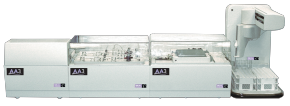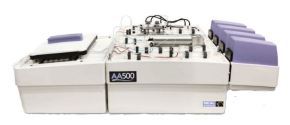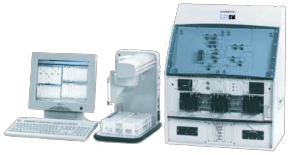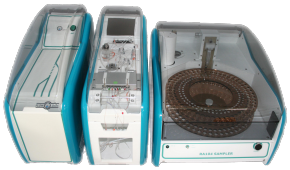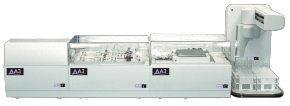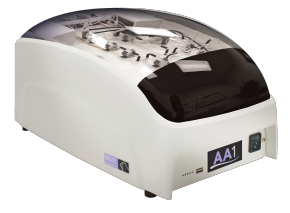Continuous flow analyzers (CFAs) are automated instruments used to analyze chemical species in liquid samples. They operate based on flowing a sample and reagents through interconnected tubing and reactors, with analyte concentrations measured using a detector. CFAs offer several advantages over other analytical instruments, including high sample throughput, high precision and accuracy, continuous monitoring, automatic sample handling, minimal sample preparation, lower cost per sample, flexibility, ease of use, reduced waste generation, and improved safety. CFAs are widely used in various industries, including environmental, food and beverage, pharmaceutical, agricultural, chemical manufacturing, petrochemical, medical, and biotechnology. When selecting CFAs, important considerations include analytical requirements, sample volume and throughput, sample matrix, automation and software, and maintenance and support. AxFlow offers CFAs suitable for a wide range of applications and provides technical support, training, and service maintenance contracts.



Continuous Flow Analyzers
8 series from 2 manufacturers
-
- Acetic Acids
- Alkalinity
- Alpha Amino Nitrogen
- Alpha Milasa
- Ammoniacal Nitrogen
- Ammonium
- Amylase
- Anionic Surfactants
- Anthocyanins
- Beta Glucans
- Boron
- Cadmium
- Carbonates
- Chloride
- Chlorides
- Chrome VI
- Cyanide
- D-Gluconic Acids
- DOC
- Free / Total Chlorine
- Free / Total Cyanide
- Fructose
- Glucose
- Glucose / Fructose
- Hydrazine
- Hydroxyproline
- Iron
- Lactic Acids
- Lysine
- Macronutrients
- Malic Acids
- M-Lactic Acids
- Nicotine
- Nicotinic Acids
- Nitrate
- Nitrite
- Nitrogen Amino
- Nitrogen Kjeldahl
- Non-ionic Surfactants
- Olsen Phosphorus
- pH
- Phenol
- Phenol Index
- Phosphate
- Phosphate-ortho
- Phosphorus Tota
- PhosphorusTota
- Polyphenols Index
- Potassium
- Protein
- Reducing Sugars
- Saccharose
- Silicate
- SO2 Free and Total
- Soluble Nitrogen
- Sugar
- Sulfate
- Tartaric Acids
- Total Acidity
- Total Nitrogen
- Total Phosphorus
- Total Sugars
- Volatile Acidity
Do you need help finding the right pump that meets your needs?
We have experienced experts who are ready to help you!
Get in touch hereThe operating principals of continuous flow analyzers
Continuous flow analyzers (CFAs) are automated instruments designed for the analysis of various chemical species in liquid samples. CFAs are based on the principle of flowing a liquid sample and one or more reagents through a series of interconnected tubing and reactors, where the reactions between the sample and reagents take place. The analyte concentrations are determined by measuring the absorbance or fluorescence of the resulting reaction product(s) using a detector.
The CFA system is composed of several components including a pump, a mixer, a detector, sampler and a computer with a control an evaluation software. The pump is used to deliver the sample and reagents at a controlled flow rate through the tubing system. The mixer ensures thorough mixing of the sample and reagents before they enter the detector. The detector is used to measure the absorbance or fluorescence of the reaction product(s), which is proportional to the analyte concentration. The valve system is controlled by a computer, which coordinates the movement of samples and reagents through the system. The probe of sampler is controlled by a computer, which coordinates the movement of samples, standards and quality controllers through the system.
The CFA system operates based on segmented flow or continuous flow. In segmented flow, the sample and reagents are injected into the tubing system as discrete segments that are separated by air bubbles. The segments are then mixed and allowed to react, and the resulting product is detected. This mode of operation is particularly useful for the analysis of trace analytes, as it minimizes reagent consumption and improves detection limits.
In continuous flow, the sample and reagents are mixed continuously, and the resulting product is detected after a suitable reaction time. This mode of operation is particularly useful for the analysis of high-concentration analytes, as it provides higher throughput and improved precision.
CFAs can be configured to perform a variety of chemical analyses, such as colorimetric and fluorometric. These assays rely on the reaction of the analyte with one or more reagents to produce a measurable signal. The choice of assay depends on the analyte, the concentration range, and the desired detection limits.
Advantages of continuous flow analyzers
CFAs offer several advantages over other types of analytical instruments, particularly in terms of sample handling, speed, accuracy, and precision.
- High sample throughput: CFA can process many samples in a short period of time. This makes them ideal for laboratories with a high sample volume.
- High precision and accuracy: CFA use precise and accurate measurements of reagent volumes, which minimizes errors in sample analysis.
- Continuous monitoring: CFA provide real-time monitoring of the analysis process, which allows for immediate detection of any problems that may arise.
- Automatic sample handling: CFA automate the sample handling process, which reduces the risk of errors caused by manual handling.
- Minimal sample preparation: CFA require minimal sample preparation, which reduces the time and effort required to prepare samples for analysis.
- Lower cost per sample: CFA use small amounts of reagents and require minimal sample preparation, which makes them cost-effective compared to other analytical methods.
- Flexibility: CFA can be customized to analyze a wide range of samples and parameters, making them suitable for a variety of applications.
- Easy to use: CFA are user-friendly and require minimal training to operate, which makes them ideal for laboratories with a high turnover of personnel.
- Reduced waste generation: CFA generate less waste compared to other analytical methods, which reduces the environmental impact of laboratory operations.
- Improved safety: CFA use automated processes that reduce the risk of exposure to hazardous materials, which improves laboratory safety.
Industries and applications that uses continuous flow analyzers
CFAs find widespread applications in diverse industries due to their versatility. They are extensively used in environmental laboratories to analyze water quality, contaminants and nutrients. The food and beverage industry employs CFAs to determine the content of various components such as sugar, protein, and other nutrients. In the pharmaceutical industry, CFAs are used for drug analysis, including drug formulations, impurities, and degradation products. CFAs are also used in the agricultural industry to determine nutrient content and quality in soil samples, plant tissue, and animal feeds. Chemical manufacturing units use CFAs for process control and quality control analysis to determine product purity and impurities. CFAs also find applications in medical laboratories for clinical analysis of samples such as blood, urine, and other body fluids.
Important considerations when selecting continuous flow analyzers
When selecting a Continuous Flow Analyzer (CFA), there are several important considerations to keep in mind, including:
- Analytical requirements: It's important to consider the specific analytical requirements of your application, such as the type of analysis required, the expected range of concentrations, and the required accuracy and precision.
- Sample volume and throughput: The sample volume and throughput requirements of your application will also impact your CFA selection. CFAs are available in various sizes and configurations to accommodate different sample volumes and flow rates.
- Sample matrix: The sample matrix, or the type of sample being analyzed, can also affect CFA performance. For example, samples with high levels of particulates may require additional filtration or sample preparation steps.
- Automation and software: Many CFAs offer automation and software capabilities that can simplify workflow, reduce manual labor, and increase throughput. It's important to consider the level of automation and software features required for your application.
- Maintenance and support: Like any analytical instrument, CFAs require regular maintenance and support to ensure optimal performance. It's important to consider the availability of technical support, service contracts, and replacement parts when selecting a CFA.
Why buy continuous flow analyzers from AxFlow
AxFlow offers CFAs for the widest range of industries and applications. Only at AxFlow do you receive individual advice from industry-experienced process engineers and the manufacturer-independent selection of the world's leading process technology. Do you need support in selecting the right analyzers for your needs? Do not hesitate to get in touch. AxFlows experts and engineers can provide guidance for selecting, specifying, installing, and maintaining your fluid handling equipment.
